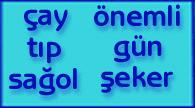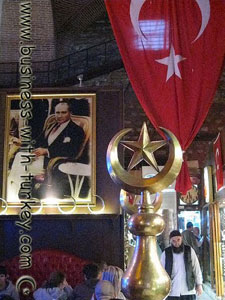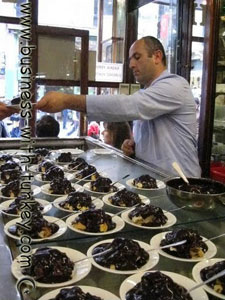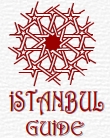Learning Turkish !
Here we have a list of Turkish words that can be used
to begin a basic conversation.
Unlike Portuguese, Spanish, Italian, etc... the Turkish
language is a difficult language to learn by the people who have English
as a mother tangle. Turkish does not come from Latin and has a ural-altaic
root. We mention as an example the word "elegance" that
is translated as "elegancia" in Portuguese, "eleganza"
in Italian, "elegant" in French and "zarif" in
Turkish. The words in latin root language are similar and in Turkish
it is completely different.
If we compare Turkish to the latin languages we will
find some few similar words. Some of these words are French, Spanish,
Arabic or words used due to globalization. Example of Turkish words
with another origin: pardon (excuse me in French), pantalon (trousers
in Spanish), saat (hour in Arabic) and telekomunikasyon (due to globalization).
Turkish language has some different characters.
See the illustration with those characters: u and o with dieresis
"ö-ü", c and s with cedilla "ç-þ",
i without the dot "ý" and g with tilde "ð."
Notes regarding the Turkish characters: We wrote
the accents of the words below in parentheses because the
computer can have problem reading those characters if it is
not configured for the Turkish language. If you want to write
those words in your computer, use the ASCII characters. Press
the key ALT of your computer with the number after it writen
at the table (keep on pressing the ALT key until all number
is typed).
|
|
ASCII Tabel with Turkish Characters
| Character |
Description |
Lower Case |
Capital Letter |
| ç Ç |
c with cedilla |
ALT 135 |
ALT 128 |
| ö Ö |
o with dieresis |
ALT 148 |
ALT 153 |
| ü Ü |
u with dieresis |
ALT 129 |
ALT 154 |
| ð Ð |
g with tilde |
ALT 287 |
ALT 286 |
| þ Þ |
s with cedilla |
ALT 351 |
ALT 350 |
| ý I |
i without dot |
ALT 305 |
I |
| i Ý |
i with dot |
i |
ALT 304 |
Sounds of the Turkish Characters:
c cedilla = ch sound of "church"
c without cedilla = j sound of "john"
s cedilla = sound sh of "cash"
i without dot = there is no simular at the english language, it sounds
like a "closed" i
g with tilde = this g is mute and it prolongs the last volgal of the
word
o with dieresis = the same sound of o with dieresis in German
u with dieresis = the same sound of u with dieresis in German
| |
Here are some examples of Turkish words:
Greetings:
hi = merhaba
good morning = gunaydin (u with dieresis, i without dot)
good afternoon = iyi gunler (u with dieresis)
good night = iyi aksamlar (s with cedilla)
|
Pronouns as Subjects:
I = ben
you (singular) = sen (in a formal conversation "siz" is used
instead of "sen". That is very common if the Turks don't each
other and are formal)
we = biz
she/ he = o (there is no distinction between feminine and masculine
in the Turkish language)
they = onlar
you (plural) = siz
Some sentences and useful words:
(the sentences below were done by using "sen" = you as pronoun subject)
please = lutfen (u with dieresis)
a glass of water please = bir bardak su lutfen (second u with dieresis)
where is XXX? = XXX nerede?
what is your name? = senin adi ne? (second i without dot)
where do you live? = nerede oturuyorsun?
I love you = seni seviyorum
I want to speak with you = seninle konusmak istiyorum (second s with cedilla)
what is your work? = ne is yapiyorsun? (s with cedilla)
what are you doing? = ne yapiyorsun?
thank you very much = cok tesekkur ederim (c and s with cedilla - u with dieresis)
how old are you? = kac yasindasin? (c with cedilla - i without dot)
let's go = gidelim
bathroom = tuvalet
man = erkek
woman = kadin (i without dot) |
|
Drinks:
beer = bira
water = su
milk = sut (u with dieresis)
coffee = kahve
tea = cay (c with cedilla)
coke = cola
water with gas = soda
juice = meyva suyu
Fruits:
melon = kavun
watermelon = karpuz
cherry = kiraz
pear = armut
apple = elma
orange = portakal (this word is interesting because the Portuguese people
brought the orange tree to Turkey. The word orange is similar to "Portekiz" which means Portuguese in Turkish)
lemon = limon
peach = seftali (s with cedilla)
Colors:
white = beyaz
black = siyah
yellow = sari (i without dot)
red = kirmizi
blue = mavi
green = yesil (s with cedilla)
Meals:
breakfast = kahvalti (i without dot)
lunch = ogle yemegi (all of the gs with tilde)
dinner = aksam yemegi (s with cedilla, g with tilde)
meat = et
salad = salata
vegetables = sebze
sweet = tatli (i without dot)
Some verbs:
to eat = yemek
to drink = icmek ( c with cedilla)
to do = yapmak
to run = kosmak (s with cedilla)
to work = calismak (c with cedilla, i without dot, s with cedilla)
to write = yazmak
to kiss = opmek (the with dieresis)
to call = telefon etmek
to watch = seyretmek
to see = bakmak
to take = almak
to leave = birakmak (i without dot)
to talk = konusmak (s with cedilla)
|
|
Numbers:
1 = bir
2 = iki
3 = uc (u with dieresis, c with cedilla)
4 = dort (the with dieresis)
5 = bes (s with cedilla)
6 = alti (i without dot)
7 = yedi
8 = sekiz
9 = dokuz
10 = on
20 = yirmi
30 = otuz
40 = kirk (i without dot)
50 = elli
60 = altmis (i without dot, s with cedilla)
70 = yetmis (s with cedilla)
80 = seksen
90 = doksan
100 = yuz (u with dieresis)
1000 = bin
Articles' Index
Read more articles about the Turkish language and related subjects:
Turkish Courses and dictionaries
Turkish Proverbs
Body language in Turkey
The story of the Turkish Language from
the Ottoman Empire until today
Hope you enjoyed our article! Thank you for visiting our site !
Please write your suggestion for an article to : istanbul gmx.co.uk gmx.co.uk
PRIVATE GUIDE
IN ISTANBUL

|










